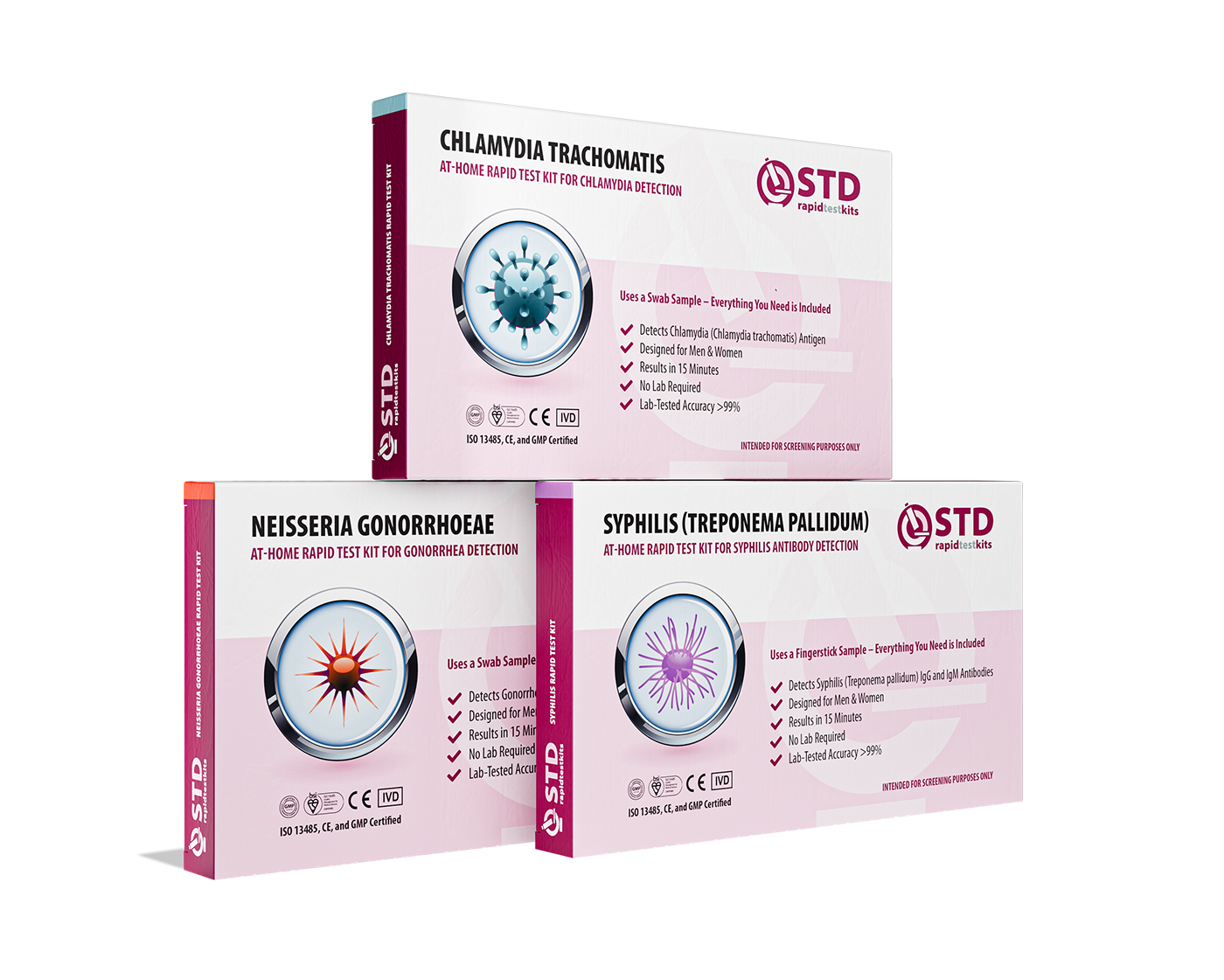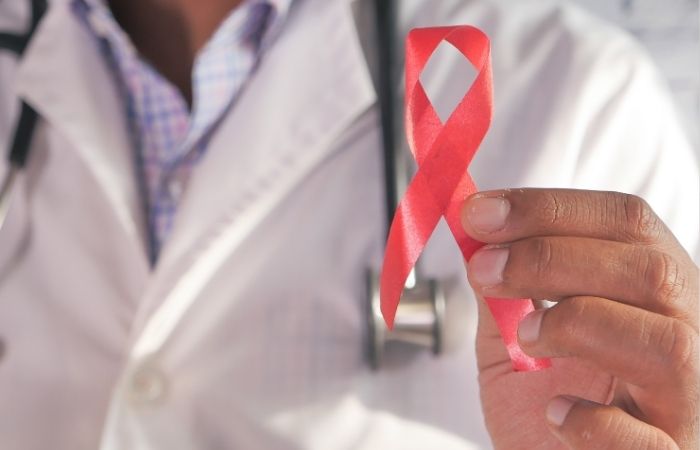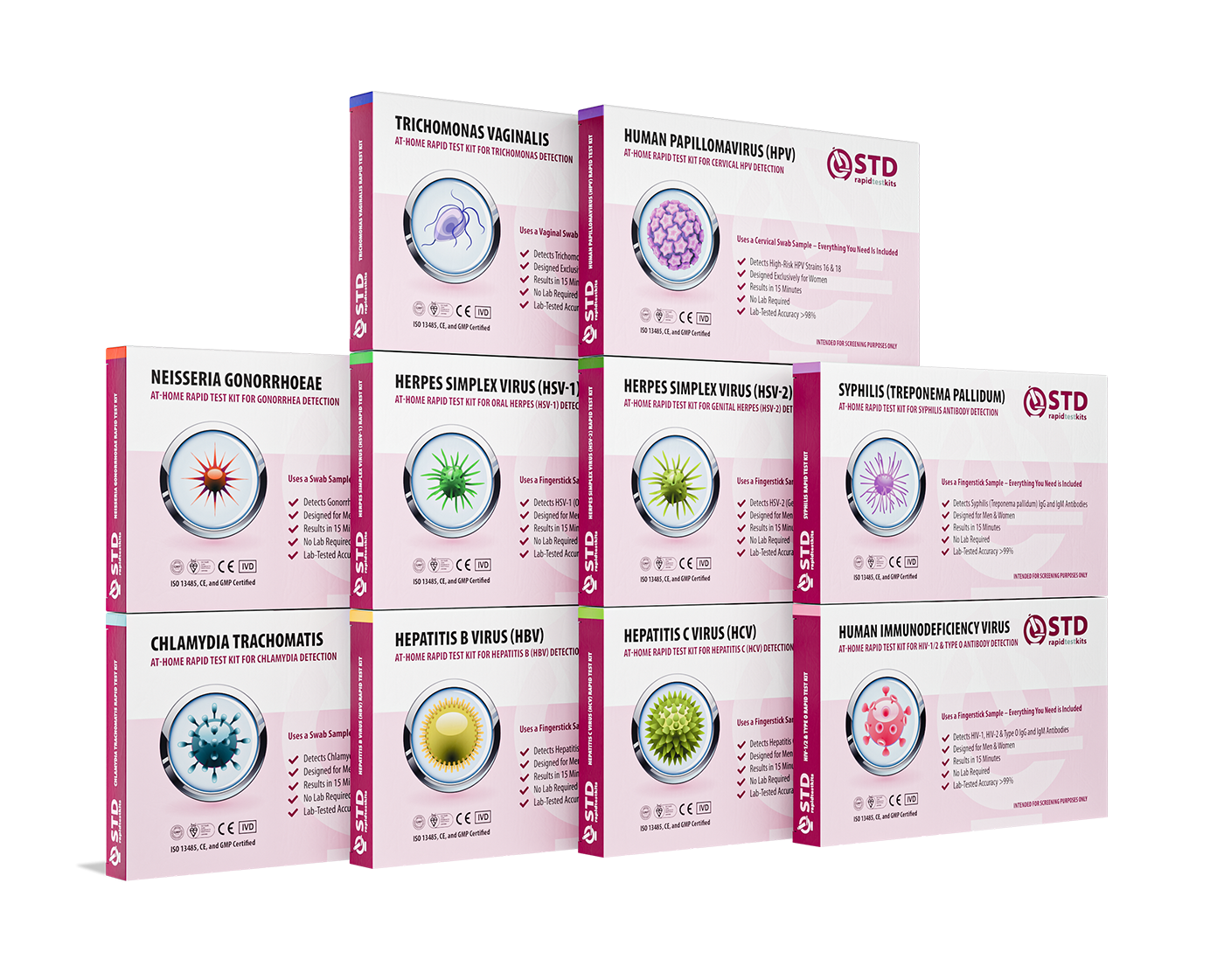Quick Answer: After an STD diagnosis, it’s common to feel shame, fear, or isolation. But with the right self-care strategies, like mental health support, honest conversations, and stigma-busting information, you can live fully and confidently. Your diagnosis doesn’t define you.
Living Well After an STD Diagnosis: Mental Health and Self-Care Tips
Your heart drops. Your brain races. Your chest tightens. You’ve just tested positive for an STD, and everything feels different. But here’s what you need to hear right now: you are not broken, dirty, or alone.
Whether it’s herpes, chlamydia, HPV, HIV, or something else, your diagnosis is not a life sentence, it’s a medical condition. And you are still lovable, sexual, and completely worthy of care. This guide is about what happens next: the emotional side of healing, and the tools that make it possible.

People are also reading: Is Your Teen at Risk? A Parent’s Guide to Teenage STDs
Step One: Feel What You’re Feeling, Without Judging It
Grief. Anger. Numbness. Fear. Maybe even relief, because now you know. There’s no “wrong” way to feel after a diagnosis. STD stigma is everywhere, and it affects how we process our results. But the truth is, your emotions are valid, even if they’re messy or contradictory.
Give yourself permission to sit with the feelings, not shove them down. Journal. Cry. Talk to a trusted friend. Or just be still. You are allowed to take up space in your own healing.
“I felt so ashamed when I found out I had herpes,” one user wrote. “But after a few weeks, I realized the shame wasn’t mine, it was society’s.”
This is where healing begins, not with fixing, but with feeling.
Normalize It: STDs Are Incredibly Common
The numbers don’t lie: 1 in 2 sexually active people will contract an STD by age 25. Genital herpes affects 1 in 6 adults. Over 80% of sexually active people will get HPV at some point. Chlamydia is the most commonly reported infection in the U.S.
And most of these people? They’re your coworkers, crushes, classmates, and exes. STDs aren’t about “promiscuity” or bad decisions, they’re about being human in a world where sex exists.
The more we talk about it, the less alone anyone feels. And if you're ready to move forward, you can take control with regular at-home STD testing.
Therapy Isn’t Weak, It’s Smart. Especially Now.
You don’t have to process your diagnosis alone. A therapist, especially one with experience in sexual health or trauma, can help you unlearn shame, challenge distorted thoughts, and rebuild your relationship with your body.
Look for mental health professionals who offer:
- Sex-positive therapy or trauma-informed care
- LGBTQ+ affirming support if it applies to your identity
- Sliding scale options or virtual access, if cost is a barrier
Even one session can help. Think of it as STI aftercare for your mind.
Check Your STD Status in Minutes
Test at Home with Remedium3-in-1 STD Test Kit

 For Men & Women
For Men & Women Results in Minutes
Results in Minutes No Lab Needed
No Lab Needed Private & Discreet
Private & DiscreetOrder Now $69.00 $147.00
For all 3 tests
Rebuilding Confidence in Dating and Intimacy
Getting back “out there” after a diagnosis can feel terrifying. But it’s absolutely possible, and it often leads to deeper, more honest relationships. You might be surprised how many people respond with care, curiosity, or even shared experience.
Confidence starts with knowledge. Learn about your infection. Know when you’re contagious, how to use protection, and what disclosure looks like. The more you know, the less power fear holds over your sex life.
“I was so scared to tell new partners I had HPV. But after three conversations, I realized most people either had it or didn’t care.”
Your diagnosis doesn’t make you less sexy. Confidence, and honesty, do.
How to Tell a Partner About Your Diagnosis (Without Panicking)
This is the part most people dread, but also the part that builds trust. Whether it’s a long-term partner or someone new, here’s a simple structure that works:
“I want to share something personal before we get physical. I tested positive for [infection]. I’ve learned how to manage it, and I care about protecting both of us. Here’s what it means and how we can stay safe.”
Stay calm. Don’t over-explain. And remember: this is about safety, not confession. If they react with cruelty or judgment? That’s not your person.
Yes, You Can Still Have Great Sex After an STD Diagnosis
News flash: having an STD doesn’t mean your sex life is over. It means your sex life gets smarter. And often, it gets better. Because when you know your status and communicate with partners, intimacy becomes intentional, not just physical.
Here’s how to keep it hot and healthy:
- Use protection: condoms, internal condoms, or dental dams depending on the infection
- Time it right: avoid sex during outbreaks or treatment periods
- Talk openly: consent and communication make sex safer, and sexier
Your diagnosis doesn’t make you “risky.” It makes you informed. And that’s a turn-on.

People are also reading: What Is Hepatitis B? A Comprehensive Guide to Symptoms, Causes, and Prevention
Body Image and Self-Worth After Diagnosis
It’s easy to feel betrayed by your body after a diagnosis, especially if you have visible symptoms like herpes sores or genital warts. But healing means remembering: your body is not the enemy. It’s the thing getting you through.
Give your body what it needs:
- Rest
- Hydration
- Gentle movement
- Affection (from yourself or others)
Look in the mirror and say: This body has survived. This body still deserves love.
Finding Community: You’re Not Alone, Not Even Close
One of the most powerful tools in your recovery? Other people who get it. Online forums, support groups, and social media communities offer more than advice, they offer validation. And that can change everything.
Try:
- Reddit: r/STD
- The Trevor Project (for LGBTQ+ youth)
- PositiveSingles (dating and forums)
There’s nothing like hearing, “Me too” from someone who’s been there. Connection kills shame.
When an STD Triggers Old Trauma, Here’s How to Ground Yourself
If your diagnosis brings up past trauma, sexual assault, abandonment, shame, it’s not a failure. It’s a flare. Your body is asking for safety. Trauma-informed care means recognizing those emotional landmines and offering yourself compassion instead of critique.
Use grounding techniques like:
- 5-4-3-2-1 sensory exercise
- Breathwork: box breathing or deep belly breaths
- Touch: hold something cold or textured
This isn’t “overreacting.” It’s your nervous system remembering. Let it pass, then keep moving forward.
Check Your STD Status in Minutes
Test at Home with Remedium10-in-1 STD Test Kit

 For Women
For Women Results in Minutes
Results in Minutes No Lab Needed
No Lab Needed Private & Discreet
Private & DiscreetOrder Now $189.00 $490.00
For all 10 tests
Reframing “Clean” and “Dirty”: The Language That Hurts Us
If you’ve ever said, “I’m clean,” you’re not alone. But it’s time to ditch that language. STD status has nothing to do with cleanliness, morality, or worth. You are not dirty for having herpes. You are not clean because you tested negative.
Say instead:
- “I was recently tested.”
- “My status is [infection], and here’s how I manage it.”
Words shape shame. Choose ones that leave room for dignity and truth.
STD Shame in BIPOC Communities: What Needs to Change
For Black, Indigenous, Latinx, and AAPI folks, STD stigma is layered. It intersects with cultural taboos, racism in medicine, and generational silence around sex. That means less testing, later diagnoses, and more fear of judgment.
Community healing starts with honest conversation. With aunties, with homeboys, with friends. With saying: this happens to us, and we still deserve care.
Dating With an STD: When to Disclose and What to Expect
There’s no perfect formula, but here’s a guideline: disclose before sex, but not necessarily on the first date. Wait until there's mutual interest and emotional safety. Then speak plainly and without apology.
If they ghost you or judge you? That’s protection, not rejection. You’re filtering for emotional maturity, and that’s sexy.

People are also reading: Fatigue From Hepatitis C: What It Feels Like and When to Get Tested
Future Planning: Parenting, Relationships, and Long-Term Health
Yes, you can still get married. Have babies. Travel. Fall in love. An STD diagnosis doesn’t derail your dreams, it just shifts the route. Talk to your doctor about pregnancy safety (especially with herpes, HPV, or HIV). Ask your partners about testing and protection.
You get to have a future that includes joy. Don’t let fear write your roadmap.
Your Story Isn’t Over. It’s Just Getting Honest.
Healing from an STD diagnosis isn’t about going back to who you were. It’s about becoming someone who knows their body, speaks their truth, and chooses self-care over shame. That version of you? They’re stronger than ever.
And if you’re ready to get back in control, at-home testing is a powerful next step.
Turn Your Diagnosis Into a Source of Power
You didn’t choose this diagnosis, but you get to choose what happens next. And that’s powerful. Maybe it pushes you to have deeper conversations. Maybe it makes you a safer lover. Maybe it teaches you that worthiness has nothing to do with test results.
Turn your story into advocacy. Into confidence. Into the kind of sexual honesty this world needs more of. Because if you can walk through shame and come out stronger? You’re already healing.
And every person you tell, every stigma you challenge, is part of the revolution.
Check Your STD Status in Minutes
Test at Home with Remedium7-in-1 STD Test Kit

 For Men & Women
For Men & Women Results in Minutes
Results in Minutes No Lab Needed
No Lab Needed Private & Discreet
Private & DiscreetOrder Now $129.00 $343.00
For all 7 tests
FAQs
1. Is it normal to feel depressed after an STD diagnosis?
Yes. It’s incredibly common to experience depression, anxiety, or even panic after learning you have an STD. The good news? These feelings are temporary, and manageable with support, therapy, and education.
2. How do I tell someone I have an STD?
Be honest, direct, and calm. Share what you have, how you manage it, and what protection looks like. Remember: you’re sharing information, not asking for permission to be loved.
3. Can I still have sex if I have an STD?
Absolutely. Many STDs are manageable with treatment or timing. You can have a healthy, fulfilling sex life, it just takes awareness and communication.
4. Will anyone want to date me now?
Yes. Millions of people live with herpes, HPV, HIV, and more, and still date, marry, and fall in love. The right people won’t judge you for a diagnosis. They’ll respect your honesty.
5. How do I cope with the shame?
Shame thrives in silence. Join a support group. See a therapist. Read real stories from people who’ve been there. Talk back to the lies in your head, and replace them with truth.
6. Do I have to tell every partner?
If the infection is sexually transmissible and you plan to have sex, yes. Disclosure is part of informed consent. But you don’t owe strangers, coworkers, or your ex the details.
7. What if I caught it from someone who didn’t tell me?
That hurt is real. And so is your right to feel angry or betrayed. But try to focus on your healing, not revenge. Educate others, and protect your peace moving forward.
8. Can I live a normal life with herpes/HPV/HIV?
Yes. Millions do. With the right treatment, support, and mindset, you can thrive. You are more than your diagnosis.
9. What if I just got diagnosed and don’t know where to start? Start with one step: breathe. Then get informed, seek support, and treat your body with care. Healing is not a race. You’ll figure it out, one day, one decision at a time.
10. Where can I find confidential STD testing and support?
STD Rapid Test Kits offers fast, discreet at-home testing for multiple infections, no clinic visits required.
This Isn’t the End, It’s the Beginning of Owning Your Story
An STD diagnosis isn’t a death sentence. It’s not a character flaw. It’s a chapter. And chapters are made to be lived, not hidden. You are still lovable. Still worthy. Still whole.
There is life after diagnosis, real, vibrant, sexual, joyful life. And the sooner you start believing that, the sooner it becomes your reality.
If you’re ready to take back control, order a discreet combo STD test kit here and give yourself the peace of mind you deserve.
Sources
1. Manage your emotional and mental health after STI – WalkingYN
2. Managing Life After an STD Diagnosis – Topline MD
3. How To Overcome The Mental Health Challenges Of Living With An STD – CCRSFL
4. 9 Tips To Handle a Positive STD Diagnosis – DocsMedicalGroup
5. The Impact of STDs on Mental Health – Hope Across the Globe










